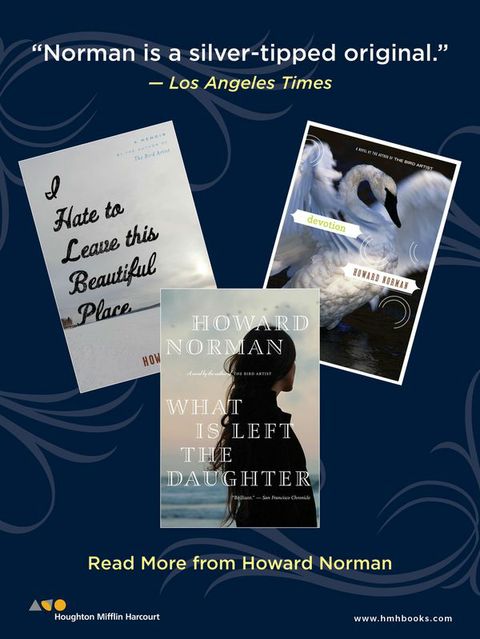I Hate to Leave This Beautiful Place (26 page)
Read I Hate to Leave This Beautiful Place Online
Authors: Howard Norman
I stepped back inside and shut the door and watched through the window as Officer Padgett got into his car. There seemed no apparent reason, but he kept his siren on the whole way down the block.
Naturally, my aunt Constance Bates-Hillyer and my uncle Donald Hillyer drove in from Middle Economy to attend the funerals. They also stayed on to help me get things in order, settle my parents' estate, so called. It consisted of 58 Robie Street, completely paid for, a modest life insurance settlement, $1,334 in a savings account, and my mother's collection of radios. “I have absolutely no idea of the worth of these radios or how to find out,” my uncle said. “We can look into that later.”
All told, my mother had fifty-eight radios. The sound of radio voices or music had almost nightly drifted into my bedroom, the volume turned up when my parents wanted to deafen me to their quarreling. Among her collection was a 1938 International Kadette, a white Silvertone, four different Bakelite models, and a Philco Transitone. She had two Fada radios, a 1939 RCA from the Golden Gate International Exposition in San Francisco (she didn't attend), a Zenith Model 835 and other wood-frame sets. She had a Crosley chrome radio, an RCA Victor La Siesta, which featured a colorful painting of a man in a sombrero sitting near a tall saguaro cactus with mountains and clouds in the distance. She had a Kadette Topper, an Emerson Snow White model that had an inlaid design of Snow White and the Seven Dwarfs (they were creepy), and three Detrola Pee Wee models, red and white, black, and blue and white. There were three small molded-plastic radios made by the F.A.D. Andrea Corporation, RCA and Crosley. She had a Bendix with a fake mottled mahogany casing, and that one had standard broadcast and shortwave bands and could operate on both AC and DC power. In the last three years of her life, my mother preferred novelty sets adorned with popular celebrities. For instance, there was a Stewart Warner set with a decal of the famous Dionne quintuplets, who'd been taken away from their parents but kept together in a foster home. My mother followed that story religiously. “Heartbreaking,” she said. “It's really too much to bear.” On the decal, the Dionne quints appeared to be about three years old. They were standing together, all hope and smiles.
On September 15, my aunt and uncle and I took a walk down to the harbor. We each held a paper cup of coffee and stood looking at the ferries, tugs, freighters and ocean liners. The steamer
Victoria
was boarding. We were close enough to see the passengers walking up the gangway, and suddenly I thought I saw Reese Mac Isaac. It was unseasonably cold, and she was wearing a camelhair coat and black scarf, holding a suitcase, though I imagine her wardrobe trunk was already on board ship. At one point she turned as if to gaze back at Halifax, and I saw her face in full. It was Reese all right. I must've let out a gasp or made some other involuntary sound, because my aunt said, “What's the matter, dear?”
“Nothing,” I said. “Nothing at all. Except I was just thinking how grateful I am for all you've done. I haven't been much of a nephew to you. I hardly ever visit.”
“That's all right, dear,” my aunt said. “When you have visited, we always had a lovely time.”
“Wyatt,” my uncle said, “the way you've been looking at those passengers makes me think you'd like to be on that steamer to New York. I've noticed some handsome women getting on board.”
“Donald, it sounds like it's
you
wishes that for yourself,” my aunt said.
Small laughter all around. “I've really only traveled anywhere with my fencing team,” I said. “I'd like to see New York someday, though.”
“You're going to need a trade, Nephew,” my uncle said. “Constance and I talked this over. Would you consider sleds and toboggans? I can use an apprentice. Someday I might leave the business to you, say it's still thriving as it's been lately. In fact, I've got orders backed up from three provinces, plus Maine and Vermont in the States.”
“Don't forget that family from Sweden who stopped to ask directions and admired your handiwork,” my aunt said.
“They spent a good hour with us,” he said.
“Well, people from those countriesâSweden, Denmark, Norway and the likeâappreciate snow toboggans, even in summer,” my aunt said.
“Lord help us, I've just had a sorry thought,” my uncle said. “What if that Swedish family wants to pay me in Swedish money?”
“I'd deal with the problem right away,” my aunt said. “Discuss it in a letter ahead of time. Then just hope the war lets a letter get to Sweden.”
“Sound advice, Constance,” he said. “I'll want to set their minds at ease that our provincial banks know how to handle such a transaction.”
The
Victoria
pulled in its gangway. “Should I sell the house, do you think?” I said. “I mean, if I take you up on your generous offer.”
“I wouldn't sell just yet,” my aunt said.
“Noâask rent,” my uncle said. “What with the view of the park, it shouldn't be difficult. No, I'd hang on to the house, Wyatt. Hang on to your mother's radios, too. If you decide yes, drive on out to Middle Economy when you're ready. Or you could leave the house unoccupied. You might want to stay in it now and then. You're a young man. There's far more entertainment in the city. Movie houses, pubs, young ladies and so forth.”
“That's not saying much,” my aunt said, “considering our entertainment at home's watching gulls bicker on the trawlers.”
“Anyway, Wyatt, you're resourceful,” my uncle said. “And besides, you'll have Joe's car, right? You can drive into Halifax any time you like.”
I slept on it, and the next morning I accepted the apprenticeship. The fact was, I didn't want to spend another minute alone in the house, deploring my circumstances. I decided to leave 58 Robie empty. My aunt and uncle went home. Several days later I stopped by my high school and filled out an official form that declared I wasn't intending to graduate. “Good luck to you, then, Wyatt,” Mrs. Cornish, the assistant principal, said. “Have you said goodbye to your friends yet?”
“I've told who I wanted to tell,” I said.
“I hear it's nice along the Bay of Fundy,” she said. “Fifty-three years in Nova Scotia and I've never been.”
Directly from the school, I drove my father's black DeSoto four-doorâbadly in need of repairs, but they could waitâto Middle Economy, smoking Chesterfield cigarettes one after the next. Nowadays it's paralleled by Highway 102, but in 1941 you could only take Route 2 north to Truro, at the center of the province. Between the roadside villages of Beaver Bank, Home Settlement, Shubenacadie, Alton, Stewiacke, Hilden and Millbrook were long stretches of woods and fields. In Truro I stopped for a sandwich at Canaan's Restaurant and took considerable time in a shop choosing a box of chocolates for my aunt. From Truro I traveled west on Route 2, the blue-gray expanse of the Minas Basin on my left, rain clouds building on the horizon. Through the villages of Central Onslow, Glenholme, Great Village, Portapique, Bass River, Upper Economy, then into Middle Economy. Because of the condition of the DeSoto I had to drive slowly. The entire trip took about four and a half hours.
My aunt and uncle's house was half a mile inland from the Minas Basin, along Cove Road. I moved into the spare bedroom. That first year I went back to visit Halifax five or six weekends, but never once slept at 58 Robie, didn't even drive past. Instead I stayed at the Baptist Spa, on Morris and Barrington, $1.25 a night. Shared washroom down the hall. Breakfast served in a small dining room on the street level.
But the evening before I'd left Halifax, my next-door neighbor on the side opposite Reese Mac Isaac's house, elderly Mr. Lessard, said he'd be willing to look after things, mow the lawn, clip the shrubbery, forward any mailâthere was little mailâleave a few lights on at night, that sort of thing. “Part of the booming nightlife of Halifax of late's been break-ins,” he said.
“I'm not too worried,” I said.
“Well, I liked Katherine and Joe,” he said. “Besides, it's hardly putting me out, now, is it? I don't take my morning constitutional to the harbor and back anymore. But I'm still capable of walking next door.”
“I appreciate it.”
“One thing, and I'd need your permission,” he said. “I'd like to have all your mother's radios on at the same time, just during
Classical Hour
out of Buffalo, as it might be the closest I'll ever get to hearing a full orchestra in person. Reese Mac Isaac's gone to New York City, anyone's guess for how long. So the radios won't disturb her. I haven't figured out yet how to plug them all in and not blow every fuse in the house, but somebody at Metcalf's Electric will advise.”
“It's all fine with me,” I said.
“I'll do this only once,” Mr. Lessard said. “It'd be a Sunday night, since that's when
Classical Hour
comes on. I'll make my decision which Sunday by checking the programming schedule in the newspaper. I won't stand for any godforsaken Vivaldi. You don't have to worry about that. Beethoven, Johann Sebastian Bach and a bunch of othersâthey're allowed. Would you care to be told on which Sunday I had all the radios on at once?”
“Not necessary,” I said.
“All right, then, Wyatt,” he said. “Good luck to you. I'll look after your house. Vivaldi won't break in. Not on my watch.”
Visit
www.hmhbooks.com
or your favorite retailer to purchase the book in its entirety.
Â


Â
Visit
www.hmhbooks.com
to find more books by Howard Norman.

Â
Two of H
OWARD
N
ORMAN
's novels,
The Northern Lights
(1987) and
The Bird Artist
(1994), were nominated for the National Book Award. His other novels include
The Museum Guard, The Haunting of L, Devotion,
and
What is Left the Daughter.
His books have been translated into twelve languages. Norman is the recipient of a Lannan Award in fiction, and he teaches at the University of Maryland.